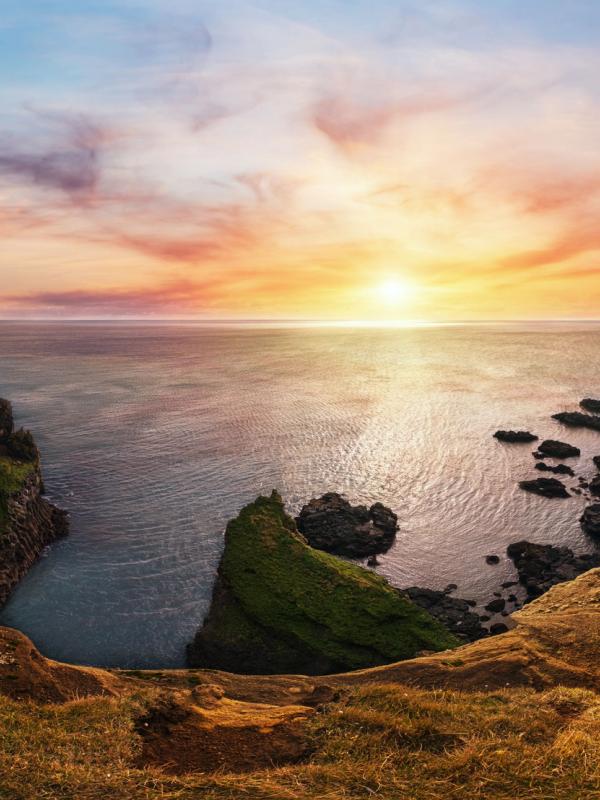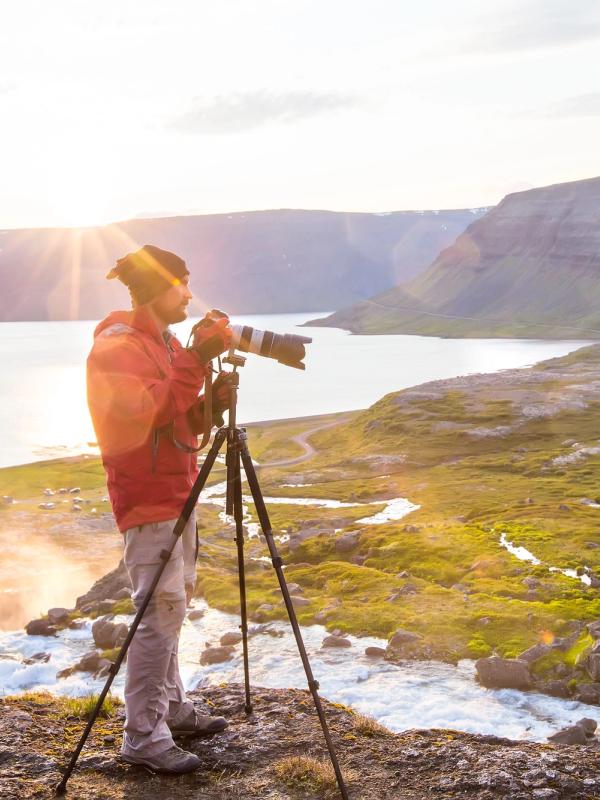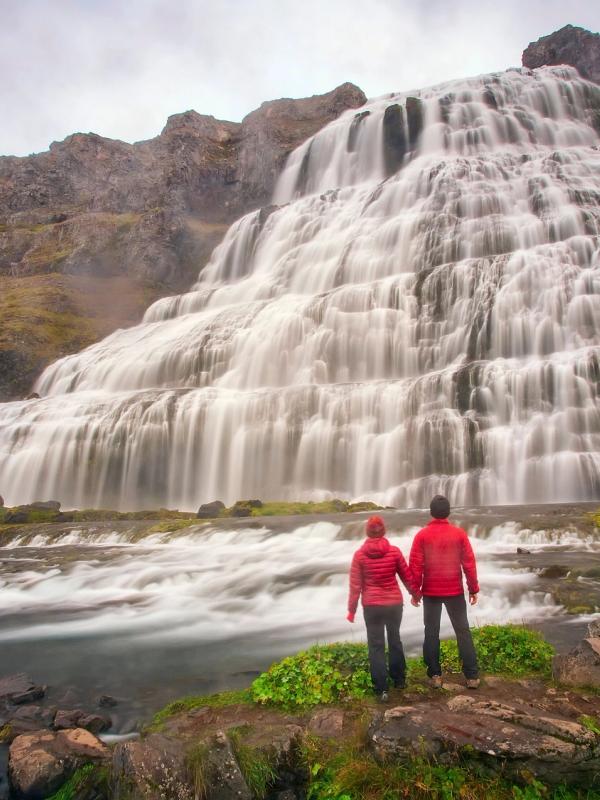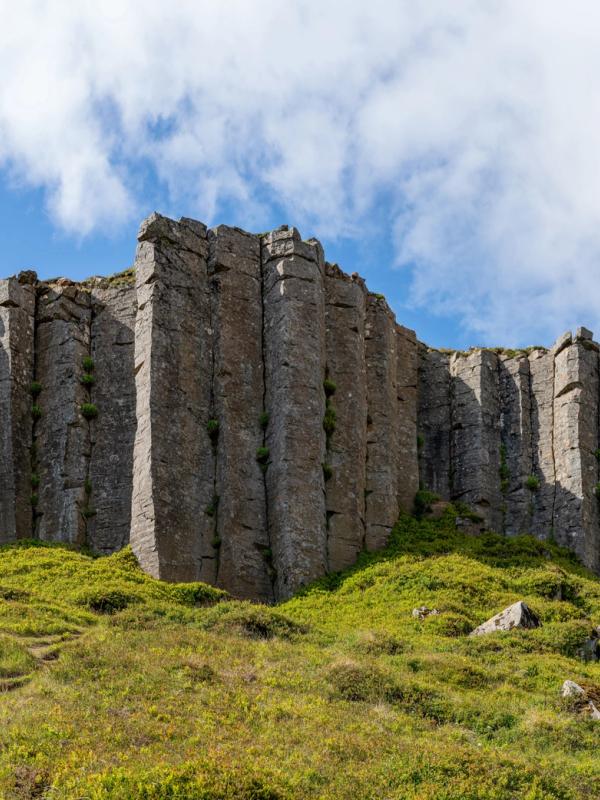
Discover the Majestic Gerduberg Cliffs: Iceland's Natural Wonder Revealed
Hidden within the mesmerising landscapes of West Iceland lies a natural wonder that stands as a testament to the raw power and beauty of nature - the Gerduberg Cliffs. Formed by cooled lava and sculpted by time, these towering basalt columns offer a spectacle unlike any other.
As we journey together through this blog post, we’ll uncover the majesty of the Gerðuberg cliffs, the geological marvel behind their formation, and the steps we can take to preserve this natural wonder for generations to come.
Key Takeaways
- Discover the majestic Gerðuberg cliffs in West Iceland, a formation of basalt columns created by volcanic eruption.
- Explore glacial lakes and icicle formations while admiring panoramic views from the top after a 3 km hike.
- Enjoy nearby attractions such as hot springs and whale watching with responsible tourism practices to preserve its natural beauty for future generations.
Journey to Gerduberg Cliffs: Getting There and Parking
Embarking on the journey from Reykjavik to the Gerðuberg Cliffs is an adventure in and of itself, and the best way to get there is by hiring a car.
Drive north to Borganes via the Golden Circle road, then journey west along Road 54 towards the Snæfellsnes Peninsula to reach this natural wonder. As you steer your vehicle along the scenic Icelandic landscape, the anticipation builds, and the thrill of the road trip adds to the overall experience.
While the roads towards Gerðuberg Cliffs are usually in good condition, be aware that the final stretch - a dirt track leading directly to the cliffs - might pose a challenge due to potholes. Smaller vehicles might struggle to navigate this section, so do keep this in mind when selecting your rental car.
Once you arrive, there’s a designated car park where you can park your vehicle and start exploring on foot. Additional parking spots can be found along the side of the track opposite the cliffs. With a deep breath of crisp Icelandic air, you’re ready to embark on this incredible natural wonder.
The Marvel of Geology: Formation of Gerduberg Cliffs
The Iceland Gerðuberg Cliffs, located on the southern side of Snæfellsnes Peninsula, West Iceland, feature a row of perfectly shaped hexagonal basalt columns, standing tall and majestic. This might seem like an unusual thing, but this fascinating formation happened thousands of years ago during an eruption in the geological Tertiary age.
When the flowing basaltic lava ran off the massive cliffs and met the cool sea, it solidified symmetrically, creating the basalt columns that we see today. This process, known as columnar jointing, left us with the Gerðuberg Cliffs, a fortress wall of nature’s own creation, rising from the earth as if hand-carved by the giants of old. The equal flows of lava contributed to the uniformity of these magnificent formations.
The awe-inspiring Gerðuberg Basalt Cliffs are home to the impressive gerðuberg basalt columns, which stand at up to 14 meters tall and approximately 2 meters wide. The sheer scale and symmetry of these columns is a testament to the power and precision of nature’s forces, making the Gerðuberg Cliffs an unmissable stop on any Icelandic journey.
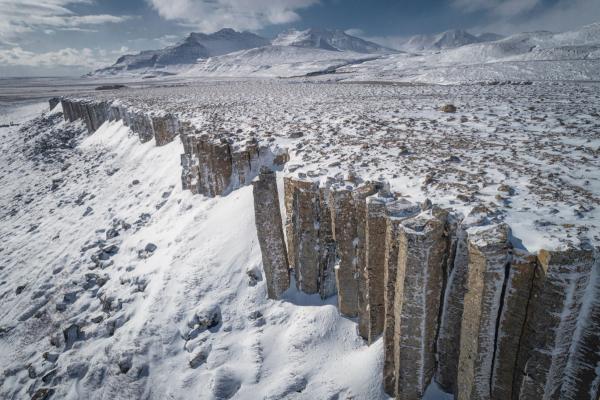
Unveiling the Beauty: Exploring Gerduberg Basalt Columns
Wandering along the Gerðuberg Cliffs, you’ll come across hundreds of basalt column stacks, a testament to nature’s artistry. To fully appreciate the cliffs without needing to climb them, consider taking a leisurely stroll along the old walking path near the cliffs or following a track up and around the back to the left of the cliffs. If you’re in the area, don’t miss the opportunity to visit Gerðuberg Cliffs and witness these magnificent basalt columns for yourself.
During winter, the cliffs transform into a winter wonderland, with the basalt columns decorated with interesting icicle formations. Regardless of the season, the views are always spectacular, including those of the nearby glacial lakes and the snow blanketed landscapes. The columns, leaning forward as if to greet visitors, create a unique spectacle that’s both intriguing and inspiring.
For a safe and comfortable exploration, wearing warm clothing and sturdy shoes is recommended. The terrain can be challenging, and the weather in Iceland can be unpredictable. So, whether you’re meandering along the base of the cliffs or attempting a more adventurous climb, proper footwear is essential.
Panoramic Vistas: Climbing to the Top
If you’re up for a challenge and yearn for a bird’s-eye view of the surroundings, the Gerðuberg cliffs provide an opportunity to climb to their summit. From this vantage point, one can take in panoramic views for miles, admiring the remarkable formation of the basalt columns and the breathtaking natural beauty of the area.
Climbing to the top of the cliffs is relatively straightforward, requiring a 3 km hike each way without any special climbing equipment. The reward is well worth the effort - imagine standing atop these massive cliffs, feeling like a part of this incredible natural wonder as you soak in the spectacular views of West Iceland.
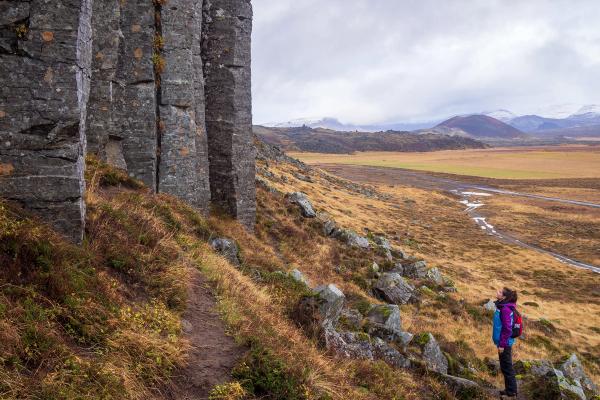
Beyond Gerduberg: Nearby Attractions and Activities
While the Gerðuberg cliffs are definitely a must-see in Iceland, an array of other natural wonders in the Snæfellsnes Peninsula are also waiting to be discovered. You can explore various attractions near the cliffs, including:
- Landbrotalaug and Sturlungalaug hot springs
- Löngufjörur beach
- Eldborg crater
- The Ytri Tunga seal colony
Additionally, the Gerduberg area offers a variety of outdoor activities, such as:
- whale-watching
- horse riding
- hiking
- birdwatching
Whether you’re marveling at the majestic cliffs or spotting seals at Ytri Tunga beach, there’s an endless array of experiences to captivate your senses and create lasting memories.
For wildlife enthusiasts, the summer season from May to July is the peak time for seal watching at Ytri Tunga beach. Seeing these creatures in their natural habitat is a truly unforgettable experience, adding to the diverse array of attractions near the Gerðuberg cliffs.
Capturing the Moment: Photography Tips and Best Times to Visit
Offering a unique blend of natural beauty and geological intrigue, Gerduberg Cliffs are a dream come true for photographers. The best time to capture these magnificent basalt columns is during the summer months when the changing light creates beautiful images. The warm golden light of sunrise and sunset can offer breathtaking visuals, while the strong shadows and highlights of midday light can also offer unique photographic opportunities.
When it comes to camera settings, a smaller aperture (higher f-stop) is suggested to ensure a greater depth of field, a lower ISO setting to reduce noise, and various shutter speeds to create different effects. If you have a wide-angle lens, a tripod for stability, a polarizing filter to enhance colors and reduce reflections, and a long lens for capturing distant subjects, these tools can greatly enhance your landscape photography at Gerduberg Cliffs.
To capture the unique textures of the basalt columns at the Gerduberg Cliffs, consider:
- Zooming in on areas where light reflects the golden tones
- Taking abstract shots of the fissures for intricate patterns
- Focusing on contrasting wave-worn boulders
- Using a slow shutter speed to capture the soft flow of water over the columns
With these tips, you’ll be well-equipped to capture the majesty and beauty of the Gerðuberg cliffs in all their glory.
Preserving the Natural Wonder: Responsible Tourism and Conservation
While admiring the breathtaking beauty of the Gerðuberg cliffs, let’s not forget our duty to protect these natural wonders for future generations. The cliffs are a designated nature reserve, and efforts have been made to conserve the distinct landscape and biodiversity of the area.
Practicing responsible tourism includes:
- Staying on designated paths
- Refraining from littering
- Respecting wildlife
- Not disturbing natural elements
- Adhering to guidelines provided by local authorities or tour operators
This ensures that we leave only footprints and take only memories.
Before embarking on your adventure, it’s recommended to wear comfortable footwear and exercise caution while climbing the steep slopes. This not only ensures your safety but also helps to minimize our impact on the environment. By doing so, we can ensure that the beauty of the Gerduberg Cliffs continues to awe and inspire for many generations to come.
Summary
From the unique basalt columns that form the cliffs to the panoramic views that extend for miles, the Gerduberg Cliffs offer an experience that is both awe-inspiring and humbling. With each step along the old walking path, each ascent to the top, and each photograph taken, we are reminded of the raw beauty and power of nature.
Whether you’re a seasoned adventurer or a casual traveler, a visit to the Gerduberg Cliffs promises a journey of discovery and wonder. So, pack your bags, don your sturdy shoes, and get ready to experience an incredible natural wonder that stands as a testament to the timeless beauty of Iceland.


